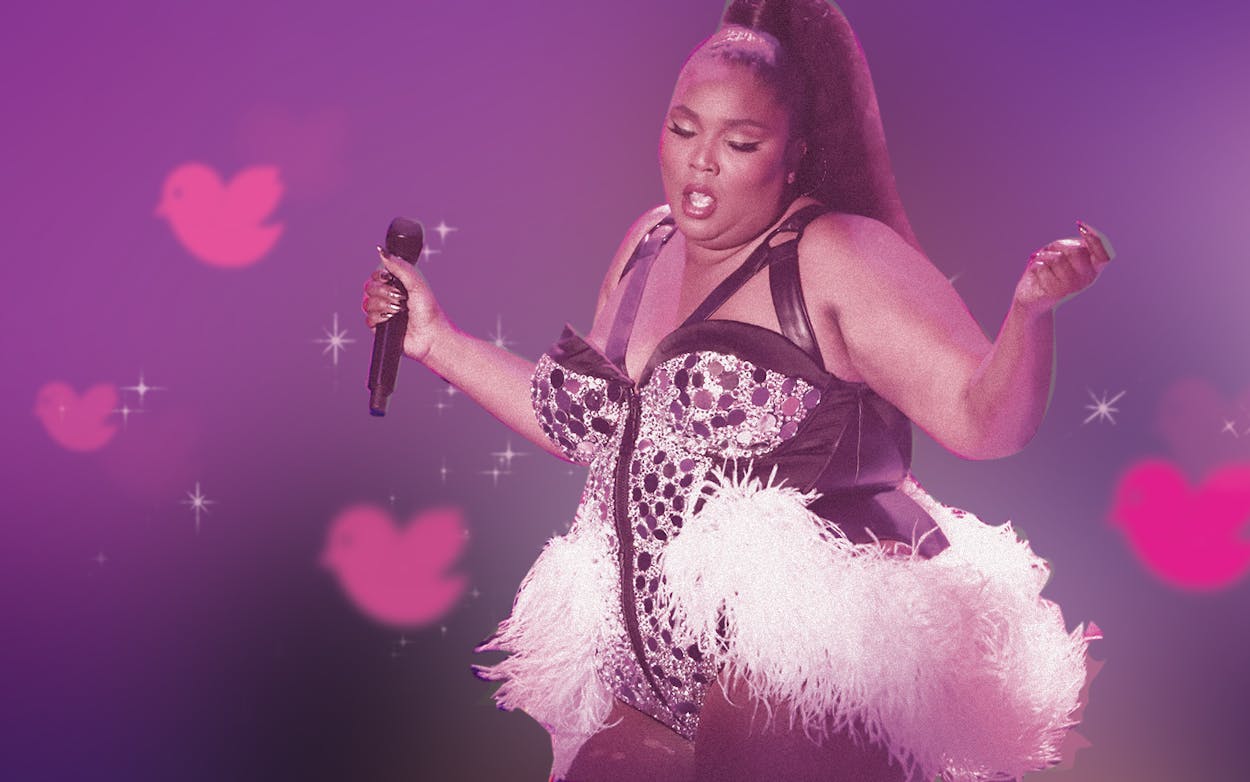Lizzo is quitting Twitter. The 2019 Entertainer of the Year kicked off her 2020 victory lap by declaring that she’s done with the social media service for the foreseeable future, tweeting, “Yeah I can’t do this Twitter shit no more.. too many trolls… I’ll be back when I feel like it.”
The announcement was delivered with the kind of self-possessed elan typical of her Twitter presence, something the Houston-bred musician has maintained at a prolific clip ever since her pre-phenomenon days. And if it’s sincere, it marks the end of—well, if not an era, exactly, then at least an important evolutionary phase in her career (though Lizzo’s management seems to still be tweeting in her stead, most recently about her forthcoming Bonnaroo headlining performance).
Yeah I can’t do this Twitter shit no more.. too many trolls… ✌🏾
I’ll be back when I feel like it.
— FOLLOW @YITTY (@lizzo) January 6, 2020
Statistically speaking, someone quitting Twitter isn’t that big a deal. Everyone should do it! Twitter can be a terrible place, somehow combining all the worst parts of open-mic nights, junior-high cafeterias, and crowded subway platforms into one choking miasma of humanity. It’s also not nearly as important as people (read: media types) make it out to be, with about only about 134 million daily active users—a statistical drop in the bucket, really. Still, some people on it are famous—some are even using it to issue threats of war—which accounts for the disproportionate weight that’s often placed on their tweets and on Twitter in general. And when they are as honest and conversational as Lizzo often was, they provide the illusion of access to the buzzing, cocktail-party excitement Twitter aspires to, even when the site more accurately resembles the hungover aftermath. So it’s telling that Lizzo quitting the service could become headline news on CNN.
Of course—and as you can see from the replies directly beneath Lizzo’s goodbye—that openness also has its pitfalls. Lizzo has used her platform to preach a philosophy of positive thinking, of gratitude and empowerment, of loving your body and being unashamed to celebrate your own accomplishments. So naturally, it’s made her a favorite target of people who feel none of those things, whose only thrill comes from lobbing petty insults over the transom, like a slingshot at the moon.
For the mere sin of being successful, Lizzo has been attacked by swarms of perpetually aggrieved “stans” for the likes of Ariana Grande and Iggy Azalea, while nearly every photo she’s shared has been smeared by some goblin hiding behind an egg avatar. She’s made the rare move of responding to some of those people, both publicly and mercilessly, and these are victories in themselves. Still, every “Lizzo Claps Back” headline has spawned a dozen more trolls, each of them vying for their own negative viral attention.
I’m popular because I write good songs and I’m talented and perform high energy hour and a half shows filled with love.
The only person who needs to do better is you.
Keep my name out ya mouth & look in the mirror before you come for me.
Here’s the attention you ordered 😏 https://t.co/zXnOv4f9Dr
— FOLLOW @YITTY (@lizzo) December 23, 2019
Lizzo’s frankness has also gotten her in trouble. In 2019, after Pitchfork offered a mixed, 6.5 review of her album Cuz I Love You, she tweeted, “PEOPLE WHO ‘REVIEW’ ALBUMS AND DON’T MAKE MUSIC THEMSELVES SHOULD BE UNEMPLOYED”—a statement that sparked an immediate backlash, not only from journalists but also from fans who felt such bitterness to be unlike her. Afterward Lizzo promised to “take my temper off the internet,” although it came roaring back just a few months later when she shared a screencap of her Postmates app, accusing a delivery driver of stealing her food. Lizzo’s million-strong following of “Lizzbians” then turned loose upon said driver, making enough threats that the driver filed a still-pending lawsuit in November, saying she “feared for her physical safety.” Lizzo apologized, pledging to be more responsible in the future. Unfortunately, the damage was already done. And it was clear that the days of Lizzo treating her social media like an unfiltered extension of herself were numbered.
I apologize for putting that girl on blast. I understand I have a large following and that there were so many variables that could’ve put her in danger. Imma really be more responsible with my use of social media and check my petty and my pride at the door. 🥺
— FOLLOW @YITTY (@lizzo) September 17, 2019
When she joined Twitter in 2011, Lizzo was an indie artist struggling in Minneapolis, singing and rapping in local groups like the Chalice and Lizzo & the Larva Ink, and posting Aaliyah tributes and cryptic journal entries to a handful of fans. Her rise is one of those rare accounts where you can witness a real-time, gradual ascension—one triumph at a time. Twitter was there for Lizzo through all of it. One could argue that it even got her where she is today, helping to create the feeling among her fans that they all share in her success.
But Lizzo doesn’t need Twitter anymore. (None of us do—although that’s beside the point.) Her fan base is self-sustaining, and while there’s something to be said for the joy and empowerment her presence still brings to the platform, the risks outpace the rewards at this point. Lizzo can turn her back on Twitter forever, if she so chooses. Besides, she and her flute are still on Instagram.






